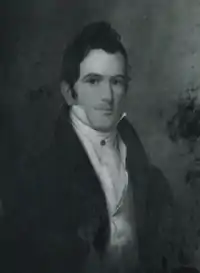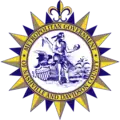John Meredith Bass
John Meredith Bass (January 19, 1804– March 14, 1878) was an American banker, planter and Whig politician. He served as the Mayor of Nashville, Tennessee from 1833 to 1834, and again in 1869.
John Meredith Bass | |
|---|---|
 | |
| Born | January 19, 1804 Nashville, Tennessee, U.S. |
| Died | March 14, 1878 New Orleans, Louisiana, U.S. |
| Resting place | Mount Olivet Cemetery |
| Alma mater | University of Nashville Transylvania University |
| Occupation | Politician, banker, businessman, planter |
| Spouse(s) | Malvina Grundy |
| Parent(s) | Peter Bass |
| Relatives | Felix Grundy (father-in-law) |
Early life
John Meredith Bass was born on January 19, 1804 in Nashville, Tennessee.[1][2] His father, Peter Bass,[3] was a real estate investor in Nashville.[1] His mother was from Kentucky.[1]
Bass was educated in Kentucky.[1] He graduated from the University of Nashville, and earned a law degree from Transylvania University.[1] He was "admitted to the bar in 1830."[4]
Career
Bass served on the board of aldermen of Nashville from 1831 to 1832, and as the mayor of Nashville in 1833 as a Whig.[5][6] Additionally, he was "one of the commissioners who built the Nashville water-works."[5]
Bass became the president of the Union Bank of Tennessee in 1837.[4][7][8] He was also the founding president of the Southern Life Insurance Company.[5] Additionally, he was the owner of plantations in Louisiana and Arkansas.[7]
Bass served on the board of trustees of the Nashville Female Academy (also known as the Old Academy),[9] and the University of Nashville.[4] In 1869, Bass served as the "receiver" of Nashville, for which he gave a $1 million bond.[5]
Personal life and death
On January 7, 1829, Bass married Malvina Grundy, daughter of Senator Felix Grundy, after she eloped at the age of eighteen.[7][3][10] He was a personal friend of slave trader John Armfield.[4][11] Like him, he owned a cottage in Beersheba Springs, Tennessee.[11]
Bass died on March 14, 1878 in New Orleans, where he was visiting his daughter.[1] He was buried with his wife in the Mount Olivet Cemetery in Nashville.[2]
References
- "THE LATE JOHN M. BASS". The Tennessean. March 23, 1878. p. 4. Retrieved November 3, 2017 – via Newspapers.com.
- "Friends of Metropolitan Archives of Nashville and Davidson County, TN". Archived from the original on 2016-03-13. Retrieved 2013-03-26.
- John Roderick Heller, Democracy's Lawyer: Felix Grundy of the Old Southwest, Louisiana State University Press, 2010, p. 173
- Howell, Isabel (March 1943). "John Armfield, Slave-trader". Tennessee Historical Quarterly. 2 (1): 3–29. JSTOR 42620772.
- "A Useful Citizen's Services". The Tennessean. March 16, 1878. p. 4. Retrieved November 3, 2017 – via Newspapers.com.
- Nashville Public Library: Mayors of Nashville, Tennessee
- Publications, Issues 51-55, East Tennessee Historical Society, 1983
- Report from the President and Cashier of the Union Bank of Tennessee, to the Tennessee Legislature, November 15, 1843
- Alfred Leland Crabb, Peabody and Alfred Leland Crabb: The story of Peabody as reflected in selected writings of Alfred Leland Crabb, Williams Press, 1977, p. 186
- Robert S. Brandt, Touring Middle Tennessee Backroads, John F. Blair Publisher, 1995, p. 383
| Political offices | ||
|---|---|---|
| Preceded by William Armstrong |
Mayor of Nashville, Tennessee 1833–1834 |
Succeeded by John Patton Erwin |
| Preceded by Augustus E. Alden |
Mayor of Nashville, Tennessee 1869–1869 |
Succeeded by Kindred Jenkins Morris |
